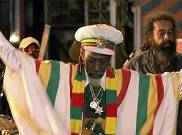|
|
||||
|
|
by Donald Levit  Shown five times on two separate days after the Closing Ceremony, Jamaican/French Made in Jamaica concludes the six-venue 16th annual African Diaspora Film Festival. Publicity bills director-writer Jérôme Laperrousaz’ 108-minute documentary as about leaders of the island’s music heritage as well as an exploration of the spread of that sound beyond the The international reach of reggae is indisputable, and travel experience knows that Bob Marley outsells Che on Nor is the catchy hesitation-beat itself truly highlighted. With dozens of performers in streets, clubs, empty train stations, studios, homes or yards, none is included complete. Depending on taste and ear, while wishing for more of some the viewer is not unhappy that others are truncated. The singers, instrumentalists, bands and composers are poorly identified by ornate brief printed titles, only two or three familiar names resonating for a general public. Although there are some older, more well-known musicians -- the gap between generations is important -- most of what is handheld filmed is the contemporary scene. Intentionally or not, what emerges is a portrait of a society at war with itself in the It is not brought out that national hero Bob Marley was himself wounded in an assassination attempt in 1976, a year of political upheaval that prompted a human rights lawyer to wonder “how many people have to carry guns before you call it a civil war.” The prime source of exchange, tourism, dropping sharply as a result, poverty and violence exploded. One strain that emerges in the film is that of the rap style that could be anywhere, its Slash gestures and lyrics macho and bloody, as compared to that of the (mostly older) artists who decry the social abyss, in terms of Jah, God, love, Marcus Garvey, Haile Selassie and Rastafarianism. Most identifiable among the latter is Bunny Wailer (Livingston), singing in the street or a station and faulting politicians for the influx and culture of illegal guns. “We kill we, nobody else.” “Politics has taken a ride, using guns to decide.” There is also gentle Coore, who, with son Isaiah or his group, talks of payback for his people’s humiliation and bondage. Or Toots (of the Maytals), or flamboyant in yellow Capleton, the “King of Fire”-“Prophet.” Most mention difficult, fatherless, church-dominated childhoods, including those whose words and performances manifest a second, emotionally violent, cultural divide, male-female. Mouthing about financial inequalities, these latter males salt their acts with profanity, references to women as good for one thing only, and onstage simulations of intercourse involving audience members. A counterbalance, and the sole humor, comes with the few ladies. Granted, there are the adolescent “gangsta ladies [that] want a gangsta baby,” but those who aren’t babies themselves are self-aware, like one who finds amusement in six siblings, all by different fathers, so “mother made the same mistake seven times.” Or calculating Lady Saw, who mugs in the mirror but got nowhere until deciding to market herself as an unabashed lowdown stage sexpot, “the baddest chick you know.” Reggae is (Released by MK2 Diffusion; not rated by MPAA.) |
||
|
© 2024 - ReelTalk Movie Reviews Website designed by Dot Pitch Studios, LLC |



